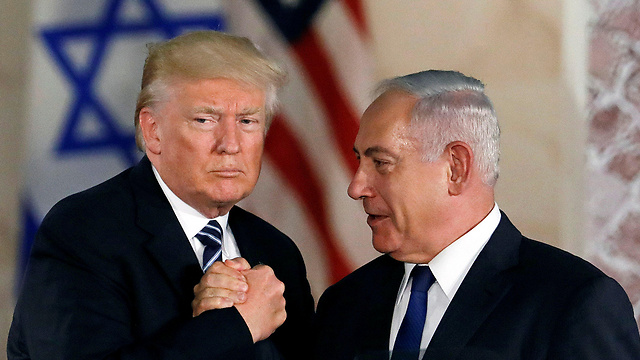
There is much to learn from President Harry Truman's resolution of a problem not unlike the one facing President Donald Trump today. Polls have consistently shown that Israeli Jews would approve with large majority a two-state resolution of the Israel-Palestine conflict conditioned on a US-Israel Mutual Defense Treaty.
During President's Trump visit to Israel, Prime Minister Benjamin Netanyahu alluded to the similarities between President Truman and his visitor. The 33rd president is best known in Israel as being the first world leader who recognized the new state 11 minutes after David Ben-Gurion's declaration of Independence on May 14, 1948. This recognition was not dissimilar to some of Trump's decisions in that it caused dismay and anger in the United States' top government echelons. The objections to Truman's decision were so vehement that even his secretary of state, George Marshall, threatened to hand in his resignation.

Although ideologically much separates the two presidents, they share traits of unpredictability and iconoclasm, and interestingly both presidents faced seemingly unsolvable problems. In 1951, Truman faced a problem whose solution is applicable to the resolution of the Israeli-Palestinian conflict, a conflict that President Trump has undertaken to resolve.
The problem that faced Truman's administration in 1951 emanated from the people of Australia's vehement opposition to the rearmament of Japan, which the US favored in its quest to enlist allies for its war against North Korea. The distrust and insecurity of the Australians in 1951 toward the Japanese—fostered by the inhuman treatment of their prisoners by the Japanese during the Second World War—was at least comparable to the distrust registered by both Israeli Jews and Palestinians in 2017.
It was the signing of the ANZUS mutual defense treaty in 1952 between the United States, Australia and New Zealand that cleared the way for signing a peace treaty with Japan and the eventual limited arming of that country. Commemorating 50 years of the ANZUS treaty, a report of the Australian Parliament stated: "Popular support for the alliance in Australia indicates that the Treaty has also provided Australians with a sense of security, which has had domestic benefits as well as benefiting the nation's regional relationships.”
Would an ANZUZ format possibly including Jordan facilitate a two-state solution of the Israel-Palestinian conflict as it did 65 years ago with respect to Australia's and New Zealand's acquiescence to the rearmament of Japan? Two public opinion polls conducted in 2012 asked Israeli Jews whether they would accept a two-state based on the Clinton Parameters and conditioned on the signing of a mutual defense treaty with the United States. When Arab League endorsement, a barrier wall and the termination of Hamas’ control of Gaza is tied in to the mutual defense treaty, 75 percent of Israeli Jews supported a two-state resolution of the conflict.
An in-depth analysis of the 2012 polls evaluates the preeminence of security over other considerations. This point is exemplified by the fact that more than 50 percent of those who intended to vote for right-wing parties supported a two-state solution backed by a mutual defense treaty. The five years since the 2012 poll have registered the disintegration of Syria, the ascendance of Iran and Russia and the creation of a coalition of Arab countries more positively disposed towards Israel—events that, if anything, may have increased the support by Israeli Jews for a mutual defense pact with the United States.
The United States has mutual defense agreements with 58 countries. Few of these countries maintain the level of military cooperation that exists between the US and Israel. According to Listaka, Israel is perceived as the third strongest ally of the United States preceded only by Great Britain and Canada. According to this source, "…The United States of America-Israel relation is the most well-known of American Government’s foreign relations. Israel is the biggest beneficiary of foreign aid from America which amounts close to a 100 billion dollars Israel is known as USA’s footing in the Middle East and provides a strong strategic position in the region…”
The de-facto existence of a US-Israel defense agreement is capsulated in statements by President Trump ("If Israel is attacked I'd one-hundred percent come to their defense") and former Vice President Joe Biden ("If you were attacked and overwhelmed, we would fight for you.") Considering the fact the US has a mutual defense treaty with a country like Montenegro, the absence of a mutual defense treaty between Israel and the United States seems anomalous. If President Trump can emulate what President Truman achieved 65 years ago by a two-state solution that addresses the security concerns of the Israeli Jews through a mutual defense treaty, he will achieve what in his own words "was the toughest deal to make."
















